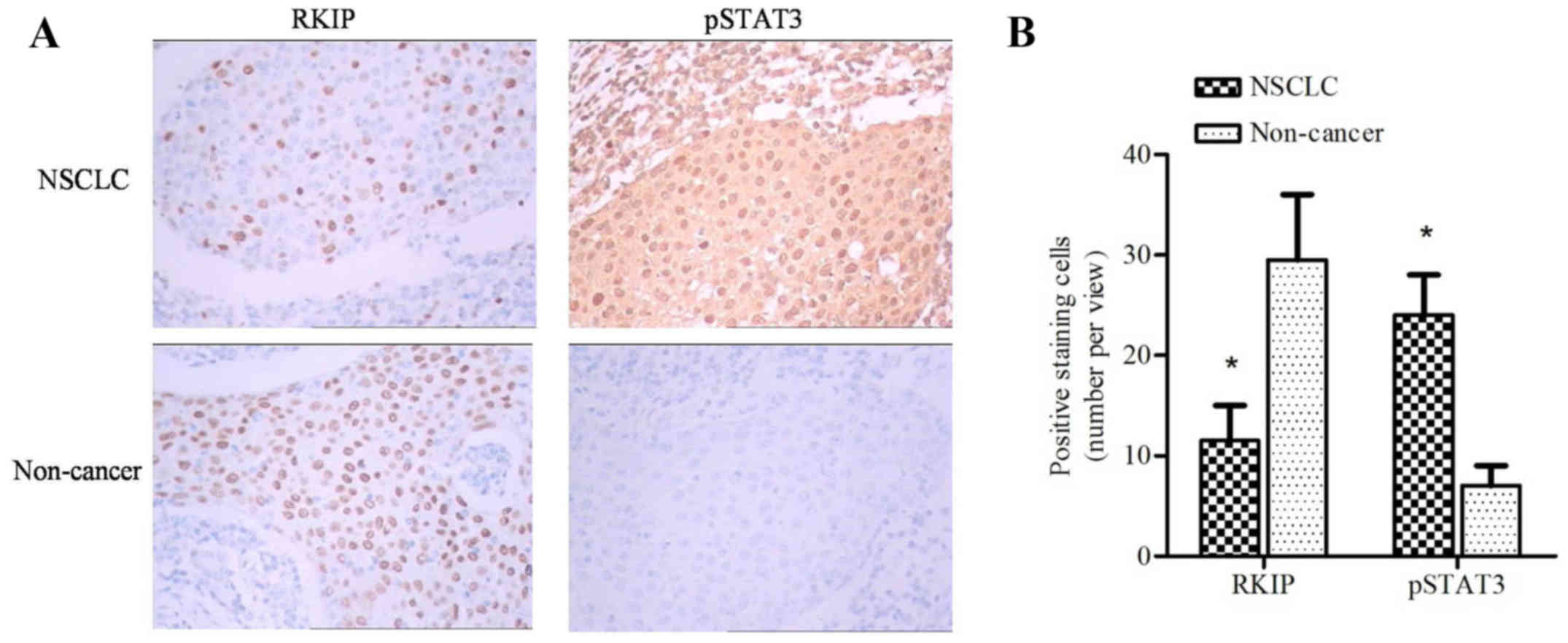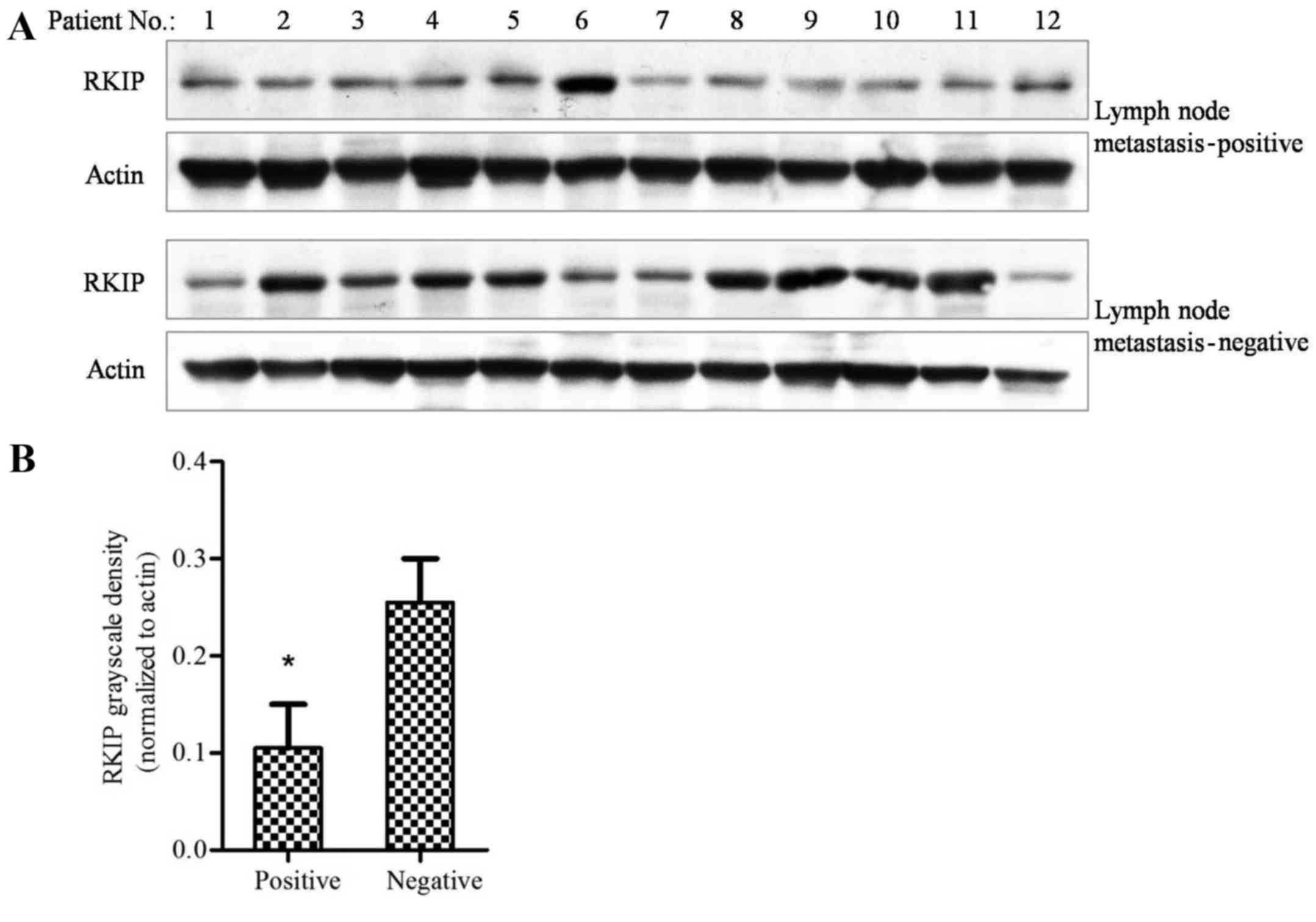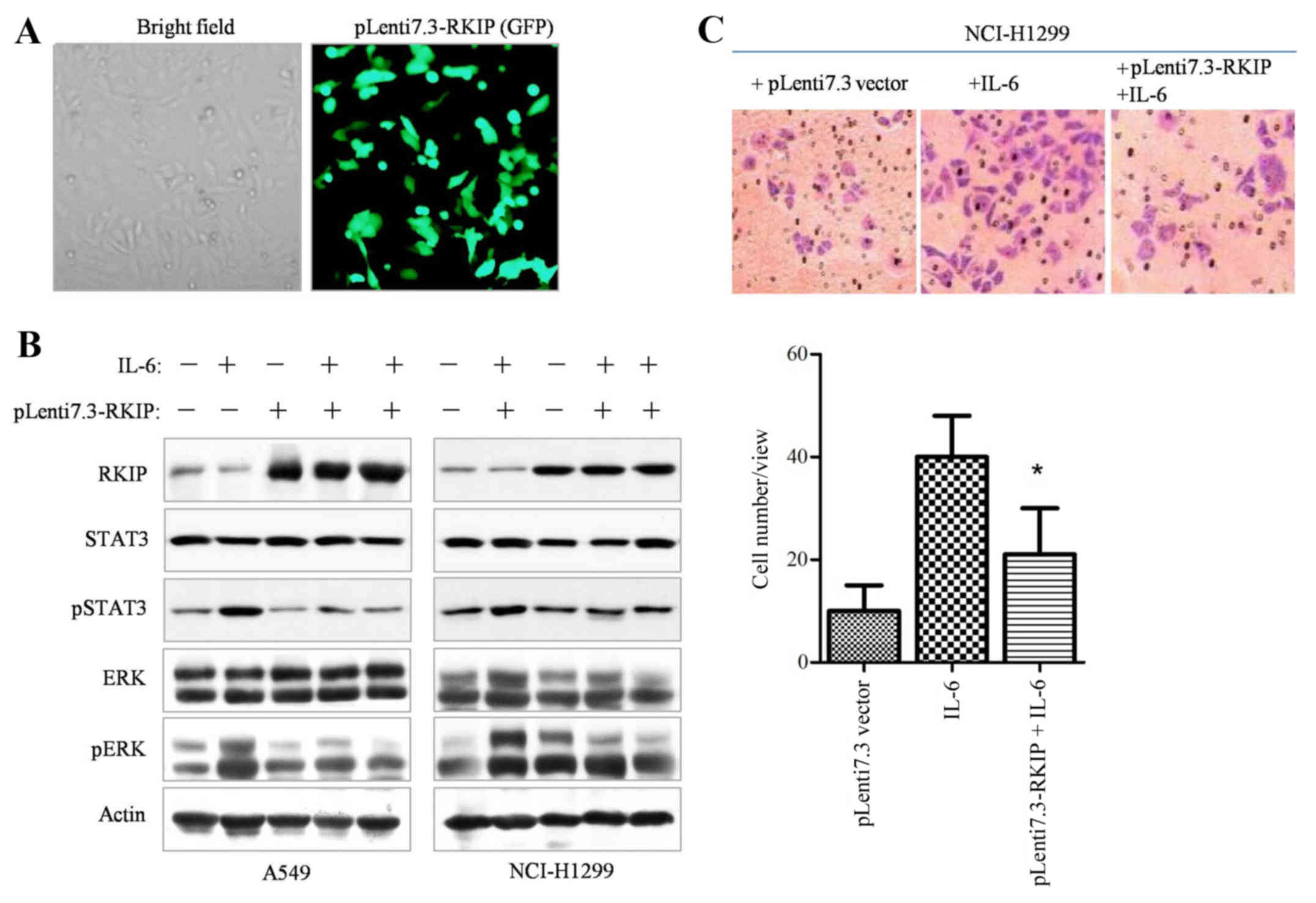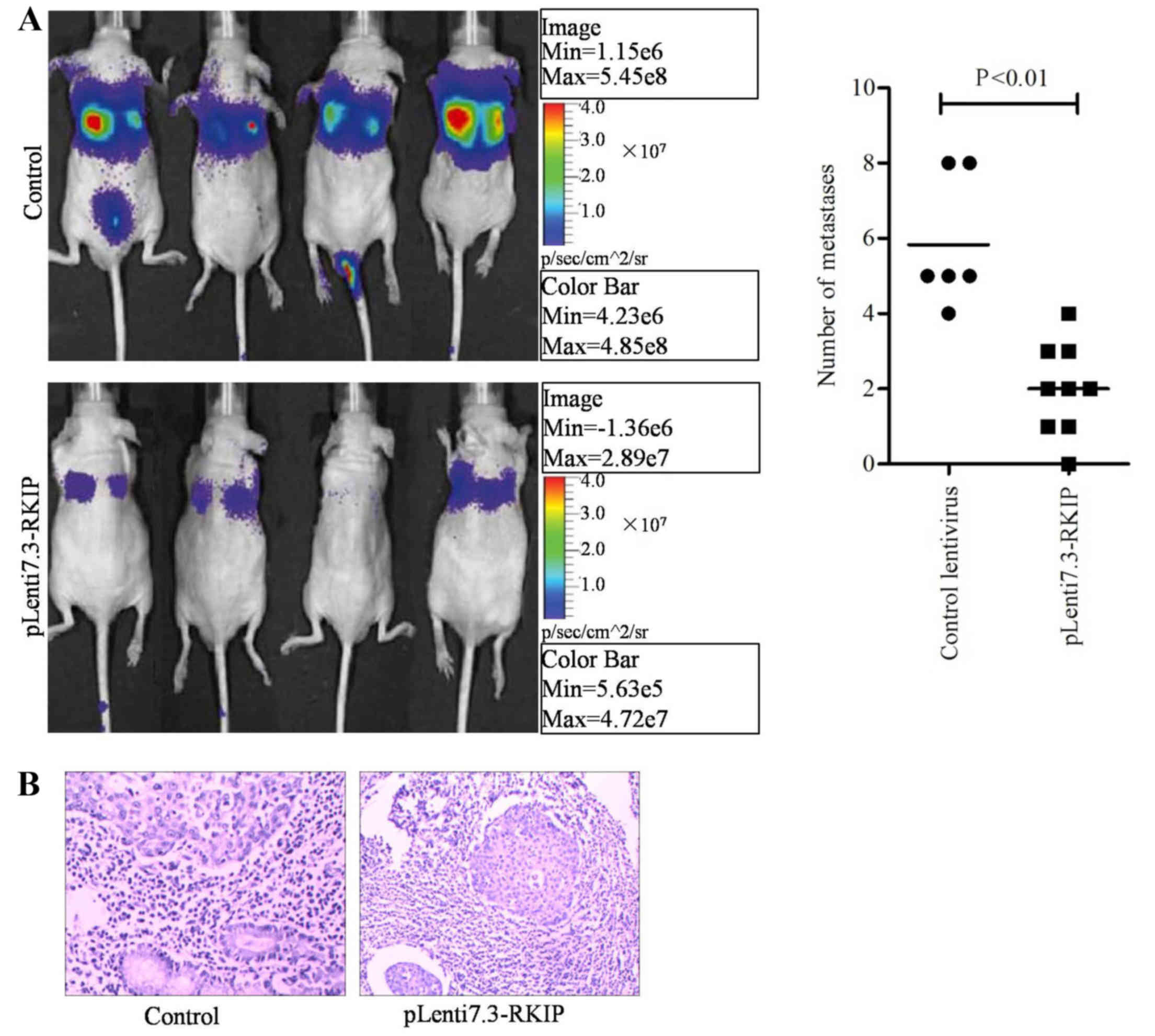|
1
|
Siegel RL, Miller KD and Jemal A: Cancer
statistics, 2015. CA Cancer J Clin. 65:5–29. 2015. View Article : Google Scholar : PubMed/NCBI
|
|
2
|
Black RC and Khurshid H: NSCLC: An update
of driver mutations, their role in pathogenesis and clinical
significance. R I Med J (2013). 98:25–28. 2015.PubMed/NCBI
|
|
3
|
Alberg AJ, Brock MV, Ford JG, Samet JM and
Spivack SD: Epidemiology of lung cancer: Diagnosis and management
of lung cancer, 3rd ed: American College of Chest Physicians
evidence-based clinical practice guidelines. Chest. 143:(5 Suppl).
e1S–e29S. 2013. View Article : Google Scholar : PubMed/NCBI
|
|
4
|
Tang Z, Li J, Shen Q, Feng J, Liu H, Wang
W, Xu L, Shi G, Ye X, Ge M, et al: Contribution of upregulated
dipeptidyl peptidase 9 (DPP9) in promoting tumoregenicity,
metastasis and the prediction of poor prognosis in non-small cell
lung cancer (NSCLC). Int J Cancer. Dec 10–2016.(Epub ahead of
print).
|
|
5
|
Goyette MA and Côté JF: NSCLC metastasis:
Going with ELMO3. Oncotarget. 5:5850–5851. 2014. View Article : Google Scholar : PubMed/NCBI
|
|
6
|
Escara-Wilke J, Yeung K and Keller ET: Raf
kinase inhibitor protein (RKIP) in cancer. Cancer Metastasis Rev.
31:615–620. 2012. View Article : Google Scholar : PubMed/NCBI
|
|
7
|
Deiss K, Kisker C, Lohse MJ and Lorenz K:
Raf kinase inhibitor protein (RKIP) dimer formation controls its
target switch from Raf1 to G protein-coupled receptor kinase (GRK)
2. J Biol Chem. 287:23407–23417. 2012. View Article : Google Scholar : PubMed/NCBI
|
|
8
|
Farooqi AA, Li Y and Sarkar FH: The
biological complexity of RKIP signaling in human cancers. Exp Mol
Med. 47:e1852015. View Article : Google Scholar : PubMed/NCBI
|
|
9
|
Yun J, Frankenberger CA, Kuo WL, Boelens
MC, Eves EM, Cheng N, Liang H, Li WH, Ishwaran H, Minn AJ and
Rosner MR: Signalling pathway for RKIP and Let-7 regulates and
predicts metastatic breast cancer. EMBO J. 30:4500–4514. 2011.
View Article : Google Scholar : PubMed/NCBI
|
|
10
|
Jia B, Liu H, Kong Q and Li B: RKIP
expression associated with gastric cancer cell invasion and
metastasis. Tumour Biol. 33:919–925. 2012. View Article : Google Scholar : PubMed/NCBI
|
|
11
|
Fu Z, Kitagawa Y, Shen R, Shah R, Mehra R,
Rhodes D, Keller PJ, Mizokami A, Dunn R, Chinnaiyan AM, et al:
Metastasis suppressor gene Raf kinase inhibitor protein (RKIP) is a
novel prognostic marker in prostate cancer. Prostate. 66:248–256.
2006. View Article : Google Scholar : PubMed/NCBI
|
|
12
|
Wang Q, Wu X, Wu T, Li GM and Shi Y:
Clinical significance of RKIP mRNA expression in non-small cell
lung cancer. Tumour Biol. 35:4377–4380. 2014. View Article : Google Scholar : PubMed/NCBI
|
|
13
|
Tan FH, Putoczki TL, Stylli SS and Luwor
RB: The role of STAT3 signaling in mediating tumor resistance to
cancer therapy. Curr Drug Targets. 15:1341–1353. 2014. View Article : Google Scholar : PubMed/NCBI
|
|
14
|
Saxena NK, Sharma D, Ding X, Lin S, Marra
F, Merlin D and Anania FA: Concomitant activation of the JAK/STAT,
PI3K/AKT, and ERK signaling is involved in leptin-mediated
promotion of invasion and migration of hepatocellular carcinoma
cells. Cancer Res. 67:2497–2507. 2007. View Article : Google Scholar : PubMed/NCBI
|
|
15
|
Jin HO, Lee YH, Park JA, Kim JH, Hong SE,
Kim HA, Kim EK, Noh WC, Kim BH, Ye SK, et al: Blockage of Stat3
enhances the sensitivity of NSCLC cells to PI3K/mTOR inhibition.
Biochem Biophys Res Commun. 444:502–508. 2014. View Article : Google Scholar : PubMed/NCBI
|
|
16
|
Gorgisen G, Ozes D, Pehlivanoglu S,
Erdogan A, Dertsiz L, Ozbilim G, Ozbudak IH, Savas B and Ozes ON:
Differential expression and activation of epidermal growth factor
receptor 1 (EGFR1), ERK, AKT, STAT3, and TWIST1 in nonsmall cell
lung cancer (NSCLC). Exp Lung Res. 39:387–398. 2013. View Article : Google Scholar : PubMed/NCBI
|
|
17
|
Ye CG, Chen GG, Ho RL, Merchant JL, He ML
and Lai PB: Epigenetic upregulation of Bak by ZBP-89 inhibits the
growth of hepatocellular carcinoma. Biochim Biophys Acta.
1833:2970–2979. 2013. View Article : Google Scholar : PubMed/NCBI
|
|
18
|
Zhang G, Liu F, Chen XY, Fang WY, Li HL,
Huang ZP, Chu HJ, Wang X and Zhao T: Construction and
identification of a recombinant lentivirus harboring small
interfering RNA targeting mouse CD99 antigen-like 2 gene. Nan Fang
Yi Ke Da Xue Xue Bao. 29:228–231. 2009.(In Chinese). PubMed/NCBI
|
|
19
|
Zheng J, Wang J, Sun X, Hao M, Ding T,
Xiong D, Wang X, Zhu Y, Xiao G, Cheng G, et al: HIC1 modulates
prostate cancer progression by epigenetic modification. Clin Cancer
Res. 19:1400–1410. 2013. View Article : Google Scholar : PubMed/NCBI
|
|
20
|
Reinmuth N, Stumpf P, Stumpf A, Muley T,
Kobinger S, Hoffmann H, Herth FJ, Schnabel PA, Bischoff H and
Thomas M: Characteristics of lung cancer after a previous
malignancy. Respir Med. 108:910–917. 2014. View Article : Google Scholar : PubMed/NCBI
|
|
21
|
Chatterjee D, Sabo E, Tavares R and
Resnick MB: Inverse association between Raf kinase inhibitory
protein and signal transducers and activators of transcription 3
expression in gastric adenocarcinoma patients: Implications for
clinical outcome. Clin Cancer Res. 14:2994–3001. 2008. View Article : Google Scholar : PubMed/NCBI
|
|
22
|
Ulivi P, Arienti C, Amadori D, Fabbri F,
Carloni S, Tesei A, Vannini I, Silvestrini R and Zoli W: Role of
RAF/MEK/ERK pathway, p-STAT-3 and Mcl-1 in sorafenib activity in
human pancreatic cancer cell lines. J Cell Physiol. 220:214–221.
2009. View Article : Google Scholar : PubMed/NCBI
|
|
23
|
Aziz MH, Hafeez BB, Sand JM, Pierce DB,
Aziz SW, Dreckschmidt NE and Verma AK: Protein kinase Cvarepsilon
mediates Stat3Ser727 phosphorylation, Stat3-regulated gene
expression, and cell invasion in various human cancer cell lines
through integration with MAPK cascade (RAF-1, MEK1/2, and ERK1/2).
Oncogene. 29:3100–3139. 2010. View Article : Google Scholar : PubMed/NCBI
|
|
24
|
Huerta-Yepez S, Yoon NK, Hernandez-Cueto
A, Mah V, Rivera-Pazos CM, Chatterjee D, Vega MI, Maresh EL,
Horvath S, Chia D, et al: Expression of phosphorylated raf kinase
inhibitor protein (pRKIP) is a predictor of lung cancer survival.
BMC Cancer. 11:2592011. View Article : Google Scholar : PubMed/NCBI
|
|
25
|
Yousuf S, Duan M, Moen EL, Cross-Knorr S,
Brilliant K, Bonavida B, LaValle T, Yeung KC, Al-Mulla F, Chin E
and Chatterjee D: Raf kinase inhibitor protein (RKIP) blocks signal
transducer and activator of transcription 3 (STAT3) activation in
breast and prostate cancer. PLoS One. 9:e924782014. View Article : Google Scholar : PubMed/NCBI
|
|
26
|
Cross-Knorr S, Lu S, Perez K, Guevara S,
Brilliant K, Pisano C, Quesenberry PJ, Resnick MB and Chatterjee D:
RKIP phosphorylation and STAT3 activation is inhibited by
oxaliplatin and camptothecin and are associated with poor prognosis
in stage II colon cancer patients. BMC Cancer. 13:4632013.
View Article : Google Scholar : PubMed/NCBI
|
|
27
|
Datar I, Qiu X, Ma HZ, Yeung M, Aras S, de
la Serna I, Al-Mulla F, Thiery JP, Trumbly R, Fan X, et al: RKIP
regulates CCL5 expression to inhibit breast cancer invasion and
metastasis by controlling macrophage infiltration. Oncotarget.
6:39050–39061. 2015.PubMed/NCBI
|
|
28
|
Zhang XM, Gu H, Yan L and Zhang GY: RKIP
inhibits the malignant phenotypes of gastric cancer cells.
Neoplasma. 60:196–202. 2013. View Article : Google Scholar : PubMed/NCBI
|



















